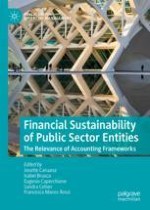2019 | OriginalPaper | Chapter
9. Financial Sustainability of Higher Education Institutions: A Challenge for the Accounting System
Authors : Guido Modugno, Ferdinando Di Carlo
Published in: Financial Sustainability of Public Sector Entities
Publisher: Springer International Publishing
Activate our intelligent search to find suitable subject content or patents.
Select sections of text to find matching patents with Artificial Intelligence. powered by
Select sections of text to find additional relevant content using AI-assisted search. powered by
